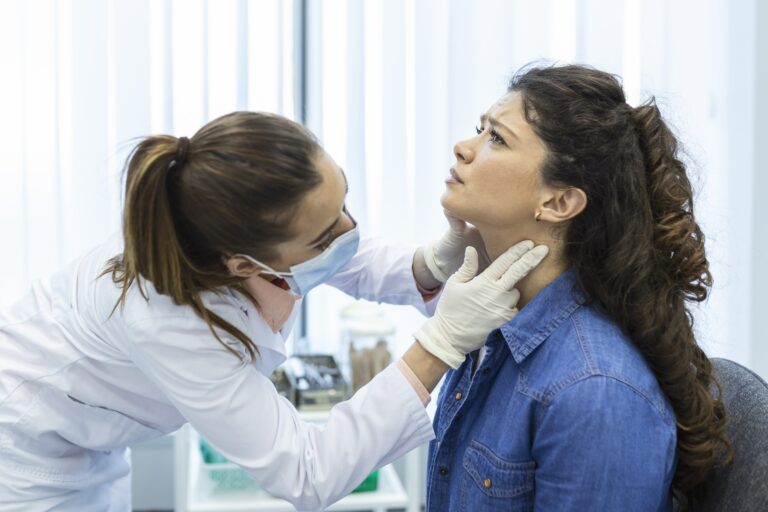What You Need to Know About the Thyroid
What is the thyroid?
The thyroid gland is a crucial gland acting as a control unit that regulates, through hormone production, vital organs and bodily functions such as metabolism, the cardiovascular system, and the reproductive system.
Thyroid malfunction can cause various disorders, including weight gain or loss, difficulty losing weight, insomnia, nervousness, and tachycardia. Thyroid disease can also lead to infertility and, during pregnancy, endanger both the mother and baby's health.
Precise epidemiological data is unavailable, but it's estimated that approximately 6 million people in Italy suffer from thyroid disorders, with a higher prevalence in women, often post-pregnancy, and a greater incidence of hypothyroidism than hyperthyroidism.
What are the links between iodine and the thyroid?
The thyroid gland requires iodine to produce thyroid hormones. Primary natural sources include foods like sea salt, eggs, cereals, and cow's milk. Shellfish and seafood also contain significant amounts. However, dietary iodine may be insufficient; increased iodized salt consumption is recommended to address deficiencies.
Conversely, with hyperthyroidism, be mindful of iodine-rich foods, limiting iodized salt, seaweed, and shellfish, and avoiding iodine-containing medications and supplements.
Other factors influence thyroid function, including caloric restriction (reducing calories to slow metabolism) and goitrogenic foods that hinder thyroid function by interfering with iodine metabolism. Medications also affect the thyroid through various mechanisms depending on the medication type.

Hyperthyroidism and hypothyroidism: how to tell the difference?
Hypothyroidism is a condition where the thyroid doesn't produce enough hormones (T3 and T4) for normal bodily function. Less commonly, it's due to tissue resistance to these hormones.
Hypothyroidism symptoms vary with age.
In adults, common symptoms include:
- Lethargy;
- Depression;
- Muscle weakness;
- Narrowed eyelids, sparse eyebrows, open mouth, and enlarged tongue;
- Dry skin and thin hair;
- Heavy menstrual bleeding;
- Joint stiffness and swelling;
- Cold intolerance and cold skin;
- Weight gain;
- Hoarseness;
- Anemia;
Unlike hypothyroidism, hyperthyroidism involves excessive thyroid hormone production. It causes significant metabolic, heart, and nervous system changes. Symptoms include extreme thinness, tremors, hyperhidrosis, and heat intolerance. Skin is warm, hair loss is common, and goiter can occur. Hyperthyroidism can also cause asthenia and psychological issues like nervousness, insomnia, and agitation, potentially leading to psychosis. Cardiovascular effects include increased heart rate, contractile force, hypertension, and left ventricular hypertrophy.
EXPRESS QUOTE
Would you like more information?
Your health, our priority.
Request your free quote
What is Levothyrox, and why was there controversy surrounding it?
Levothyrox was to gradually replace Eutirox, a long-standing thyroid medication.
Following the new formula's launch, thousands of patients reported side effects including cramps, dizziness, memory loss, fatigue, insomnia, and digestive problems. However, these weren't officially attributed to the drug. A report from the ANSM (French National Agency for Medicines and Health Products Safety) found no new adverse effects specific to the new formula, stating that the effects "indicate a thyroid imbalance related to the change in treatment" and had occurred with the older formula.
At the time of the agency's analysis, only four deaths were reported, all involving individuals with serious pre-existing conditions or high daily medication dosages. However, this changed dramatically over the following months. September saw 14,633 adverse effect notifications, a number that has increased further since.
What is a "thyroid nodule"?
Thyroid nodules are well-defined, abnormal enlargements of parts of the thyroid gland.
Varying in size, they are usually benign, with malignancy being rare.
What to do in case of benign thyroid nodules?
For benign nodules, monitoring via blood tests (thyroid function) and yearly ultrasounds may suffice. If the nodule remains stable, no treatment is needed.
Sometimes, T4 (levothyroxine) treatment is prescribed to reduce TSH (thyroid-stimulating hormone) production, which stimulates thyroid tissue growth.
Surgery may be necessary for large nodules causing breathing or swallowing difficulties, even if benign.
Are thyroid cancers becoming more frequent?
Thyroid cancer is relatively common, accounting for 3-4% of all cancers and predominantly affecting women aged 40-60. Cases have risen sharply in recent decades, largely due to the discovery of small carcinomas during ultrasounds. This increase likely reflects improved detection rather than a true surge in incidence.
How to take care of your thyroid?
Lifestyle choices can support thyroid health.
To support thyroid function, limit dairy, gluten (wheat, kamut, spelt, rye, barley, and some oats), and soy (except fermented products like miso, natto, tempeh, and tamari). Avoid alcohol and coffee, which can hinder thyroid hormone conversion in the liver.
Regular physical activity, such as brisk walking for at least an hour three times a week, benefits thyroid function. Avoid excessive exercise.